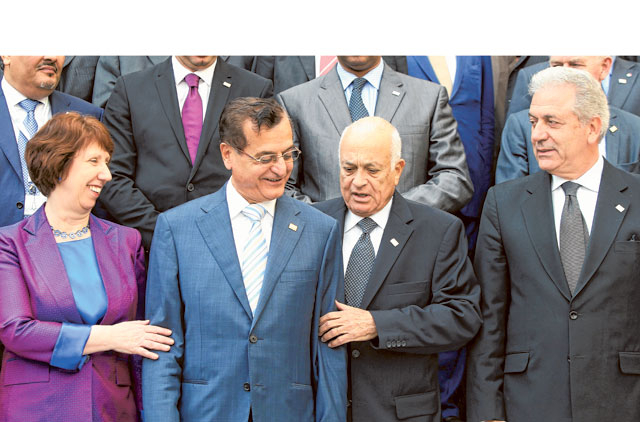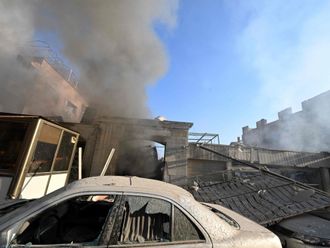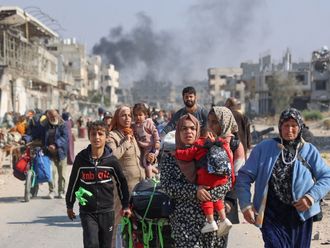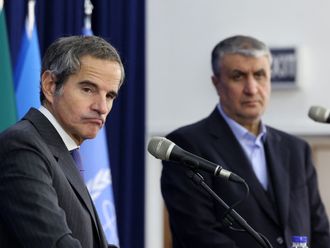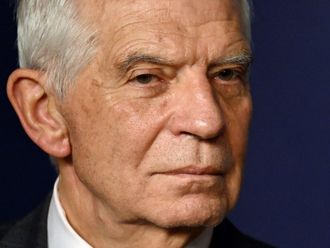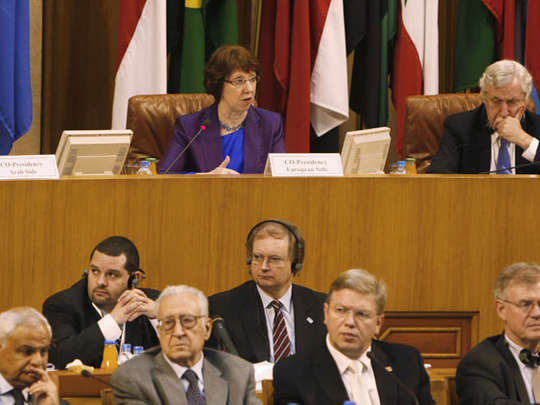
Cairo/Geneva: European Union foreign ministers meeting in Cairo welcomed a newly formed Syrian opposition bloc but declined to recognise the alliance, instead urging it to bring in more regime dissenters.
After four days of talks in the Qatari capital Doha, Syrian opposition groups agreed on Sunday to unite under the banner of the National Coalition headed by moderate Muslim cleric Ahmed Moaz Al Khatib.
“It is a very important milestone and a very big step towards [recognition],” British Foreign Secretary William Hague told reporters on the sidelines of an EU-Arab League meeting.
French Foreign Minister Laurent Fabius and EU foreign policy chief Catherine Ashton also offered backing for the National Coalition.
“Now they are united, it’s very important... France will support them,” Fabius told reporters.
Meanwhile, rebel fighters in Syria on Tuesday dismissed Gulf and Western support for a new opposition bloc, expecting little to change on the ground unless they get cash and weapons.
“For one-and-a-half to two years, we’ve paid blood for our freedom. People have left their homes and die here every day and no one cares,” said 40-year-old Abu Osama, manning a checkpoint close to the Syrian-Turkish border.
“If they do something we can see on the ground, that’s better than sitting outside the country in hotels, eating and drinking while we’re here dying every day,” Abu Osama said.
More than 37,000 people are estimated to have died in the nearly two-year uprising to bring down Syrian President Bashar al-Assad. The United Nations estimates that another 1.5 million have been affected by the war.
Many fighters feel betrayed by the international community, particularly the West, for refusing to consider a no-fly zone of the kind so instrumental in bringing down Muammar Gaddafi in Libya.
On the other hand, Syria’s air force bombed a rebel-held region near the border with Turkey for a second day Tuesday, killing at least one person and wounding three others, an official said.
The aerial attack raised the two-day death toll in the region to an estimated 31 people. Nearly 10,000 Syrians have fled into Turkey since Friday, seeking safety from shelling and bombing.
In Geneva, the UN refugee agency said Tuesday that the increasingly dire security situation in Syria has forced it to pull staff out of an area previously considered safe, and is disrupting aid supplies.
“We are temporarily withdrawing staff from the northeastern Hasakeh governorate,” UNHCR spokeswoman Melissa Fleming told reporters in Geneva, referring to an area on the Turkish border where deadly fighting has flared around the town of Ras al-Ain.
She said five aid workers would leave the area on Tuesday, leaving seven others to coordinate the relief effort.
Thousands of Syrians have fled the Ras Al-Ain area since fighting between rebels and Syrian government forces flared last week. On Monday alone, at least 16 people were killed in air strikes and shelling of rebel positions, according to a rights watchdog monitoring the 20-month conflict.
In total, UNHCR has 350 staff in Syria working out of Damascus, the northern battleground of Aleppo and Hasakeh.
“Even areas that used to be calm” are now affected by the fighting, Fleming said, adding that over the past two weeks many aid supplies had been lost, including 13,000 blankets that were destroyed by fire in an Aleppo warehouse apparently hit by a shell.
A truck carrying another 600 blankets was hijacked on its way to Adra outside Damascus, said Fleming, adding that it was unclear who was responsible.


